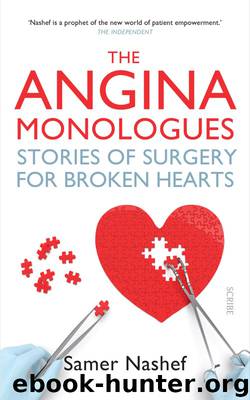The Angina Monologues by Samer Nashef

Author:Samer Nashef
Language: eng
Format: epub
Tags: BIO017000, SCI000000, MED010000, SCI036000, MED076000, HEA010000
Publisher: Scribe Publications Pty Ltd
Published: 2019-05-08T16:00:00+00:00
CHAPTER 11
Irony
One of my contributions to the field of medicine is the EuroSCORE model. This is a system which takes a few characteristic features of a heart patient and calculates the likely risk of death or disaster from a heart operation on that patient. Knowing the likely risk of an operation helps the patient and the surgeon decide whether or not it is worthwhile to go ahead. It also helps in measuring the quality of a heart surgery programme. By comparing the expected risk of death in a group of patients with the actual death rate when the operations are carried out, we can form an idea about whether the unit is performing as expected, better than expected, or worse.
Yesterday I received a phone call from Swetta, one of our surgical trainees. She was regaling me with a number of unexpected and highly unpleasant post-operative complications that one of my patients had developed all at once. She wanted my opinion and advice on how best to manage these complications. Once we had finished the conversation and had formulated a plan for the patient, she declared, ‘By the way, I think this EuroSCORE system of yours is a bit rubbish, because there is an important risk factor missing in the calculations.’
‘Oh really?’ I asked. ‘What risk factor would that be, then?’
‘It’s simple,’ she said. ‘The patient being a doctor should be considered a EuroSCORE risk factor.’
She was speaking tongue-in-cheek, of course, but alluding to the fact that the patient in question happened to be a doctor: he worked as a general practitioner nearby. On top of that, many of his family members were also doctors and his son was a cardiothoracic anaesthetist, working within my field of cardiac surgery in a unit in the north of the country. If ever one wanted an operation to go smoothly … and yet here he was, having most of the complications a patient could have after a heart operation all at once. The trainee was expressing the commonly held view that doctors make the worst patients, and by that she did not mean that they can be demanding. She was referring to the widely held perception amongst all of us that it is always the bloody doctors who get the worst complications and do badly.
The irony of such happenings is not lost on us surgeons. I do not think that there is any statistical truth in the assertion that doctors do less well than other patients when they have operations, but despite that, I cannot help approaching any patients who themselves are medically qualified with some trepidation, always expecting the worst. Even more so, the trepidation increases the closer I feel such patients are to my own profession of surgery; and it also increases in direct proportion with their perceived importance in the medical world, and with their geographical proximity to my hospital, Papworth. I guess that the maximal possible stress will occur when I am referred a fellow cardiac surgeon at Papworth who is also very highly prominent internationally.
Download
This site does not store any files on its server. We only index and link to content provided by other sites. Please contact the content providers to delete copyright contents if any and email us, we'll remove relevant links or contents immediately.
Periodization Training for Sports by Tudor Bompa(8247)
Why We Sleep: Unlocking the Power of Sleep and Dreams by Matthew Walker(6694)
Paper Towns by Green John(5174)
The Immortal Life of Henrietta Lacks by Rebecca Skloot(4571)
The Sports Rules Book by Human Kinetics(4377)
Dynamic Alignment Through Imagery by Eric Franklin(4205)
ACSM's Complete Guide to Fitness & Health by ACSM(4048)
Kaplan MCAT Organic Chemistry Review: Created for MCAT 2015 (Kaplan Test Prep) by Kaplan(3998)
Introduction to Kinesiology by Shirl J. Hoffman(3763)
Livewired by David Eagleman(3762)
The Death of the Heart by Elizabeth Bowen(3601)
The River of Consciousness by Oliver Sacks(3593)
Alchemy and Alchemists by C. J. S. Thompson(3509)
Bad Pharma by Ben Goldacre(3420)
Descartes' Error by Antonio Damasio(3270)
The Emperor of All Maladies: A Biography of Cancer by Siddhartha Mukherjee(3140)
The Gene: An Intimate History by Siddhartha Mukherjee(3091)
The Fate of Rome: Climate, Disease, and the End of an Empire (The Princeton History of the Ancient World) by Kyle Harper(3055)
Kaplan MCAT Behavioral Sciences Review: Created for MCAT 2015 (Kaplan Test Prep) by Kaplan(2979)
